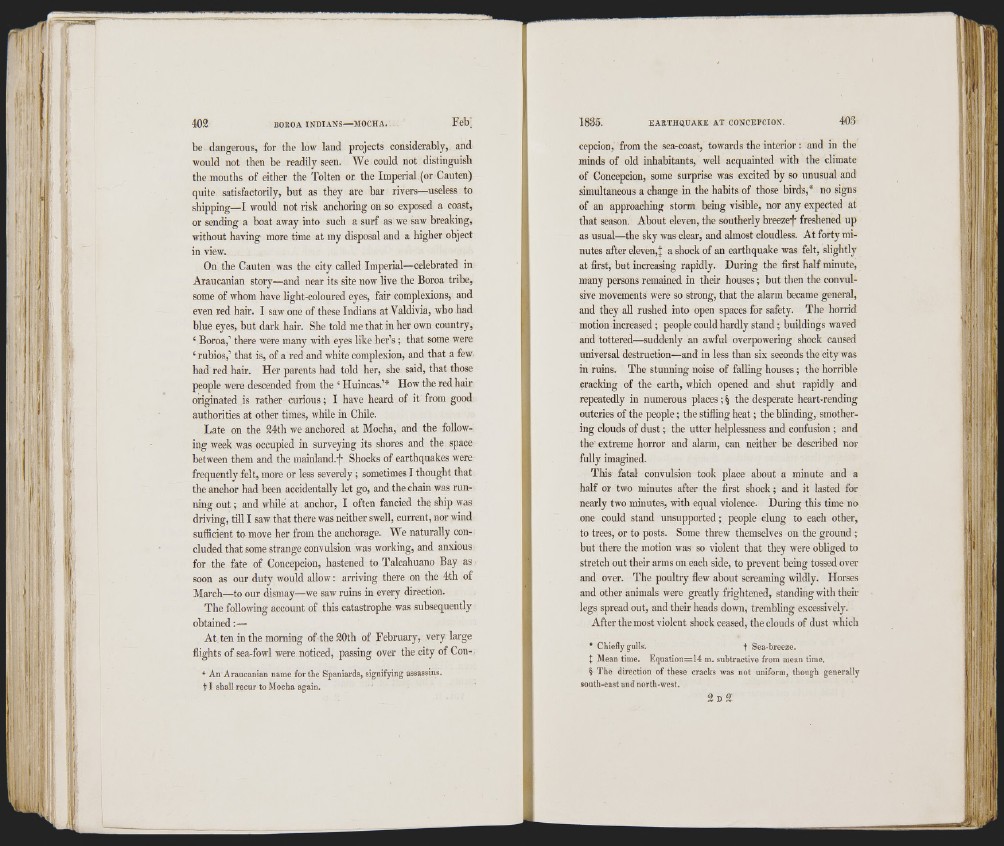
BOROA INDIANS MOCHA. Feb
be dangerous, for the low land projects considerably, and
would not then be readily seen. AVe could not distinguish
the mouths of either the Tolten or the Imperial (or Cauten)
quite satisfactorily, but as they are bar rivers—useless to
shipping—I would not risk anchoring on so exposed a coast,
or sending a boat away into such a surf as we saw breaking,
without having more time at my disposal and a higher object
in view.
On the Cauten was the city called Imperial—celebrated in
Araucanian story—and near its site now live the Boroa tribe,
some of whom have light-coloured eyes, fair complexions, and
even red hair. I saw one of these Indians at Valdivia, who had
blue eyes, but dark hair. She told me that in her own country,
‘ Boroa,’ there were many with eyes like her’s ; that some were
‘ rubios,’ that is, of a red and white complexion, and that a few.
bad red hair. Her parents had told her, she said, that those
people were descended from the ‘ Huincas.’* How the red hair
originated is rather curious ; I have heard of it from good
authorities at other times, while in Chile.
Late on the 24th we anchored at Mocha, and the following
week was occupied in surveying its shores and the space
between them and the mainland.! Shocks of earthquakes were
frequently felt, more or less severely ; sometimes I thought that
the anchor had been accidentally let go, and the chain was running
out ; and while at anchor, I often fancied the ship was
driving, till I saw that there was neither swell, current, nor wind
sufficient to move her from the anchorage. AVe naturally concluded
that some strange convulsion was working, and anxious
for the fate of Concepcion, hastened to Talcahuano Bay as
soon as our duty would allow : arriving there on the 4th of
March—to our dismay—we saw ruins in every direction.
The following account of this catastrophe was subsequently
obtained : —
At ten in the morning of the 20th of February, very large
flights of sea-fowl were noticed, passing over the city of Con-
♦ An Araucanian name for the Spaniards, signifying assassins.
11 shall recur to Mocha again.
cepcion, from the sea-coast, towards the interior : and in the
minds of old inhabitants, well acquainted with the climate
of Concepcion, some surprise was excited by so unusual and
simultaneous a change in the habits of those birds,* no signs
of an approaching storm being visible, nor any expected at
that season. Ahout eleven, the southerly breeze! freshened up
as usual—the sky was clear, and almost cloudless. At forty minutes
after eleven,] a shock of an earthquake was felt, slightly
at first, but increasing rapidly. During the first half minute,
many persons remained in their houses; but then the convulsive
movements were so strong, that the alarm became general,
and they all rushed into open spaces for safety. The horrid
motion increased ; people could hardly stand; buildings waved
and tottered—suddenly an awful overpowering shock caused
universal destruction—and in less than six seconds the city was
in ruins. The stunning noise of falling houses ; the horrible
cracking of the earth, which opened and shut rapidly and
repeatedly in numerous places; § the desperate heart-rending
outcries of the people; the stifling heat; the blinding, smothering
clouds of dust; the utter helplessness and confusion ; and
the extreme horror and alarm, can neither be described nor
fully imagined.
This fatal convulsion took place about a minute and a
half or two minutes after the first shock; and it lasted for
nearly two minutes, with equal violence. During this time no
one could stand unsupported; people clung to each other,
to trees, or to posts. Some threw themselves on the ground ;
but there the motion was so violent that they were obliged to
stretch out their arms on each side, to prevent being tossed over
and over. The poultry flew about screaming wildly. Horses
and other animals were greatly frightened, standing with their
legs spread out, and their heads down, trembling excessively.
After the most violent shock ceased, the clouds of dust which
* Chiefly gulls. f Sea-breeze.
} Mean time. Equation=14 m. subtractive from mean time.
§ The direction of these cracks was not uniform, though generally
south-east and north-west,
2 d 2